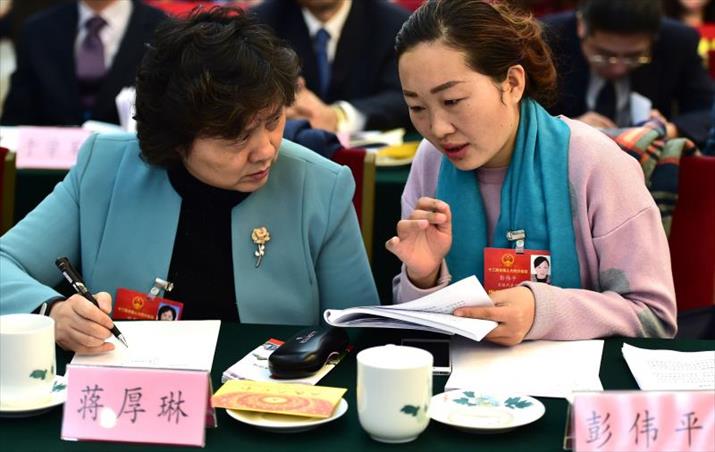|
||||||||||
| Home Nation World Business Opinion Lifestyle ChinAfrica Multimedia Columnists Documents Special Reports |
|
||||||||||
| Home Nation World Business Opinion Lifestyle ChinAfrica Multimedia Columnists Documents Special Reports |
| Current Cover Story |
| Evaluating Equality |
| China ahas made great strides in promoting gender equality but a change of mindsets is still required |
| By Ni Yanshuo | VOL. 9 March 2017 ·2017-02-24 |
Obstacles in mind

Women deputies to the National People's Congress in 2016 (LIU JUNXI)
Despite the progress shown in these figures, obstacles still exist when it comes to improving women's social status, especially in their career development.
According to 2016 Women, Work and Happiness White Paper released by Lean in China, an online platform promoting gender equality and women's career development, most women believed that the major challenges they face in their career development are: work-life balance (86.3 percent), career disruption due to child bearing (73.63 percent) and responsibility at home and supporting their husbands (70.42 percent). The white paper noted that 63.2 percent of married women took the main responsibility of child rearing.
"It's easy to promote gender equality in real life through various measures such as policies and laws, but it is difficult to change the discrimination deep in people's mind," said Liu Li.
Liu, 40, had held a high-level position as a lecturer in a local university in Xiamen, a coastal city in southeast China's Fujian Province, for 11 years. But just before the Chinese Lunar New Year, she resigned and found a job in a small company so that she could have more time to take care of her three-year-old son.
"I am well educated and can have a good job, thanks to the progress made in gender equality in the past years," said Liu. "But I have the feeling that when I try to take care of my family, I cannot work well in my career, and vice versa."
Because of these family responsibilities Liu had lost several promotion opportunities. "In order to take care of a family, either the husband or the wife should sacrifice his or her career," said Liu. "In most circumstances, it is the wife."
Liu's husband is also a teacher at the same university and was recently promoted to professor. "I am a traditional woman and I know I must quit my job in order to better take care of my son so that my husband can put more time into his work and make greater progress in his career," said Liu. "I don't know whether it is a kind of gender inequality, but I made the decision by myself."
Because women take maternity leave after giving birth, many companies and institutions are reluctant to recruit women and even fire them for various fictitious reasons when they become pregnant.
In most parts of China, women can have at least 98 days of paid maternity leave. In Guangdong Province, the leave can be 178 days for natural labor and 208 days for Caesarean birth. These special measures for women stipulated by law have become the reason for some companies and institutions to find excuses to fire women employees.
"They do not want to shoulder extra costs and would rather hire men, who can work all year round," said He Zhen, a lawyer of Beijing Zhicheng Legal Aid and Research Center for Migrant Workers. "This is against the law and women should collect evidence and sue related units once they encounter such discrimination."
Starting January 1, 2016, China implemented the two-child policy, allowing a family to have two children. "In this context, more efforts should be made from both the government and social organizations to better safeguard women's rights and interests," He said.
He noted that both husband and wife should take equal responsibilities in raising their children, instead of putting the responsibility only on the wife. "We still have a long way to go to change people's minds in this regard and realize gender equality in the real sense."
| Previous1 |
| About Us | Contact Us | Advertise with Us | Subscribe |
| Copyright Beijing Review All rights reserved 京ICP备08005356号-5 京公网安备110102005860号 |